Seven Baku rules – When Aliyev’s MPs were shown the door
- Different kinds of elections
- Baku rule one: There are many “candidates”
- Baku rule two: Gudret always stands
- Baku rule three: There is a glass ceiling for candidates not called Aliyev
- Baku rule four: an Aliyev always wins
- Baku rule five: there is no campaign
- Baku rule six: election day is calm while many want to vote
- Baku rule seven: at election times jails fill up with critics
- A dramatic week in Strasbourg
- Voices from the 2024 January debate: “Enough is enough”
- Final score: 76 to 10
Dear friends of ESI,
Two weeks ago today, a historic debate on Azerbaijan took place in the Council of Europe. We put together a compilation on this remarkable episode in the history of Europe’s leading human rights institution. Given the history of relations between the Council of Europe and Azerbaijan, this was a watershed moment. A decade ago, this would have been unthinkable. And yet it happened. Here is how:
When Aliyev’s MPs were shown the door
A historic PACE debate – January 2024
Today, two weeks after this debate, Ilham Aliyev was elected president of Azerbaijan for the fifth time in a row: after 2003, 2008, 2013, 2018, also now in 2024. On this occasion, please find our short comprehensive guide to the logic behind presidential elections in this Caspian state:
Seven Baku Rules
How (not) to have elections
Different kinds of elections
There are competitive and fair elections, like the parliamentary elections that took place in the Netherlands in November 2023. There are competitive and unfair elections, like the parliamentary and local elections that took place in Serbia in December 2023. There are competitive elections for life, like those of a pope. Once chosen, a pope does not need to win re-election.
And then there are presidential elections in Azerbaijan. Although a presidential term in Azerbaijan is in theory limited to seven years, the experience since 1993 suggests that once a president was elected, it was de facto for life.
And so today, on 7 February 2024, presidential elections were held again. As we published a little guide to understand these, the result had not been announced yet. Elsewhere, this might have been inconvenient. Not in the case of Azerbaijan. We ventured a guess: that Ilham Aliyev, the incumbent, would win re-re-election with more than 80 percent of the vote. And that other candidates were likely to each gain between 1 and 3 percent. We guessed quite well. It was not hard: we just had to study the “Baku rules for presidential elections”.
Baku rule one: There are many “candidates”
In April 2018, there were seven men competing to come second behind Ilham Aliyev. In February 2024, it was six men. Some of them were the same as before.
The Glorious Seven, Presidential Election 2018







Gudret – Zahid – Razi – Serdar – Hafiz – Araz – Ferec
The Glorious Six, Presidential Elections 2024




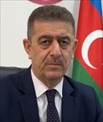

Gudret – Zahid – Razi – Fazil – Elsad – Fuad
Baku rule two: Gudret always stands
One of these six candidates, Gudret, has been standing in presidential elections already five times: in 2003, 2008, 2013, 2018 and now in 2024. The fact that he never won more than 3 percent of the vote has not discouraged him so far. There is also a positive trend for him: In 2003 he got 0.5 percent of the vote. In 2018 it was 3 percent. Will 2024 be better? Gudret should not get up his hopes too high, we wrote, because …
Baku rule three: There is a glass ceiling for candidates not called Aliyev
… the trend in recent elections has been that no candidate who is not called Aliyev gets above ten percent. In 1998, the runner-up won 12 percent. In 2003, it was 14 percent. Since then, a lower glass ceiling held: In 2008, the runner-up won 3 percent. In 2013 5.5 percent. In 2018 3 percent. What will it be in 2024? Will the two-digit ceiling be broken again? (Spoiler: no!)
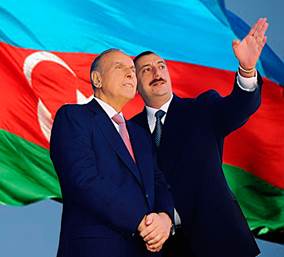
Father and son
Baku rule four: an Aliyev always wins
This is the most obvious and predictable rule about presidential elections in Azerbaijan. Look at the results in all presidential elections since an Aliyev – first father Heydar, then son Ilham – competed. Their worst result was 77 percent, when an inexperienced Ilham stood for the first time in 2003. Since then, getting above 80 percent has been the rule.
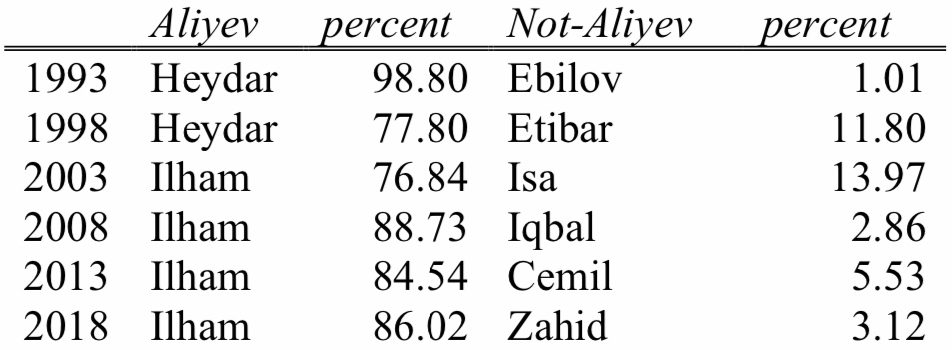
Baku rule five: there is no campaign
There were debates. The sitting president did not show up to these, however, but send someone else to represent him. In such debates, different candidates expressed their appreciation of the achievements of the incumbent president. The tone was friendly. A favourite topic in 2024 was recent military victories. In the debate on 17 January, Razi noted:
“Yes, the people of Azerbaijan won a great victory. All our problems were related to Karabakh. Despite all difficulties, we created a solid state, a powerful state. And we liberated Karabakh! Now it’s time to channel billions worth of investments to ease our citizens’ lives.”
Baku rule six: election day is calm while many want to vote
Election day passes without too much excitement. There are international election observers, who come from all over the world to admire elections that are “technically well organized.” And there is usually a high turn-out, above 70 percent. (Spoiler: also in 2024)
Baku rule seven: at election times jails fill up with critics

Forbidden stories on Azerbaijan
Correlation is not causation, so we cannot say with certainty that there is a linkage between these two facts: first, that (early) presidential elections are taking place in February 2024; and second, that the number of political prisoners in Azerbaijan has doubled in recent months.
Video: “Torture in Azerbaijan: How European Funds Flow to Baku’s Prisons”
A former political prisoner, human rights defender Leyla Yunus, who lives in the Netherlands today, maintains with others the best list of current political prisoners. It is updated regularly. Here is the recent trend:
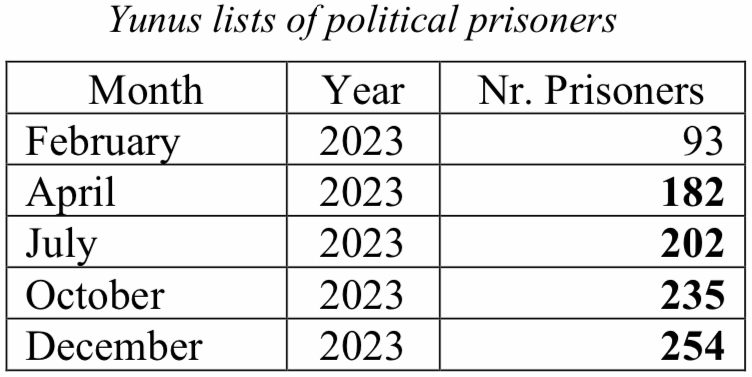
However, those in jail in Azerbaijan do not lose their right to vote for Ilham Aliyev. His results are usually even better among inmates in the penitentiary system than among the rest of the population. This might be called the eighth Baku rule.
A dramatic week in Strasbourg
On the opening morning of the first day of the Parliamentary Assembly of the Council of Europe’s (PACE) winter session in January 2024, Frank Schwabe, a German Social Democrat, stood up to present a motion to “challenge the still unratified credentials of the delegation of Azerbaijan on substantive grounds.” He was urging his colleagues to suspend the participation of Azerbaijani parliamentarians in the Assembly on account of a “serious violation of the basic principles of the Council of Europe.”


Frank Schwabe challenging credentials – Azerbaijani delegation leaving PACE
Video of Frank Schwabe challenging the credentials
It was a bold move, leading to a historic debate. Since its first meeting in August 1949, the Assembly has imposed sanctions just four times. The first two occasions followed coup d’etats – in Greece in 1967 (resulting in the suspension of the Greek delegation in 1969) and in Turkey in 1980 (resulting in the suspension of the Turkish delegation in 1981). Both delegations were excluded from the work of the Assembly.
Since 1990, on two occasions the credentials of the Russian delegation were ratified with restrictions. In April 2000, at the height of the second Chechen war, the Russian delegation was stripped of its voting rights but remained in the Assembly. The same happened in 2014, following Russia’s annexation of Crimea. One month before Russia’s full-scale invasion of Ukraine in February 2022, however, as Russian troops were brought to the Ukrainian borders, PACE was ratifying the Russian credentials.
Voices from the 2024 January debate: “Enough is enough”

Mogens Jensen, Denmark
“Unfortunately, more than 20 years after joining the Council of Europe, Azerbaijan has still not fulfilled major commitments stemming from its membership of our organisation.”

Davor Ivo Stier, Croatia
“When I was selected as chair of the Group of the European People's Party group a few days ago, I did not imagine that my first intervention would be about not ratifying the credentials of a national delegation. I believe that nobody here was looking forward to this situation … We are in this situation due to the decisions taken by the authorities in Baku. To disregard all the signals that were sent by this Assembly, not fulfilling the obligations of every member state in the Council of Europe and of every delegation in this Assembly.”

Bjarni Jonsson (Iceland)
“Today this institution, the Council of Europe, our Assembly, is choosing between Azerbaijan's credentials and its own. Because if we allow ourselves to be separated from our rules, our obligations, our commitments to protecting human rights in our own member states, we collectively undermine and lose all credibility.”

Yves Cruchten, Luxembourg
“As you know, I've been away from this Assembly for five years now. I'm coming back, and I'm coming to the realization that time travel is actually possible, because I feel [we have] turned back to the year 2013 or 2018. We deal today with the exact same problems with Azerbaijan as we did 10 years ago …
Therefore it is crystal clear to me that no progress was made, absolutely none, by Azerbaijan in all those years and that they also don't give the impression that they are willing to improve the situation, on the contrary … Human rights defenders, journalists, NGOs in Azerbaijan cannot operate freely. Prisons are filling up with political prisoners, elections don't meet our standards. The Council of Europe cannot turn a blind eye to this anymore.”
Final score: 76 to 10
In the end, the result of the vote was announced by the PACE president. It was clear:
“We have 90 votes, 76 in favour, 10 against, 4 abstentions … therefore the credentials of the delegation of Azerbaijan are not ratified.”
By the time this was announced, the Azerbaijani delegation had already left the Palace of Europe in Strasbourg. Ilham Aliyev might still be able to ensure that he wins every election in his country. He can no longer guarantee this for votes on human rights in European institutions.
Sincere regards,

Gerald Knaus
PS: More on what this means, and how this watershed vote might become a positive turning point for human rights in Europe, soon! More:
Seven Baku Rules
How (not) to have elections
When Aliyev’s MPs were shown the door
A historic PACE debate – January 2024
ESI: Background Caviar Diplomacy
On 22 January 2024, the credentials were challenged. On 23 January, two committees looked at this challenge. The Monitoring Committee produced a report: “Challenge, on substantive grounds, of the still unratified credentials of the parliamentary delegation of Azerbaijan“ On 24 January, the plenary debate and vote took place on a resolution, based on this report: “Challenge, on substantive grounds, of the still unratified credentials of the parliamentary delegation of Azerbaijan.“
All documents on this debate are here.

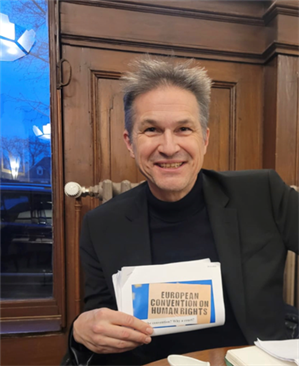
Late January 2024 in Strasbourg

